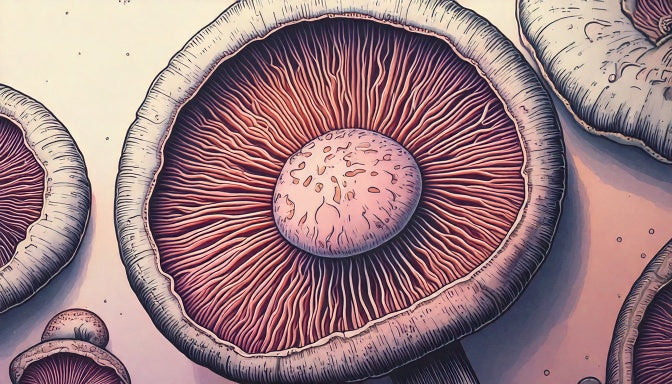If you’ve ever found yourself clutching your stomach after a meal, wondering why your gut seems to have a mind of its own, you’re not alone.
Irritable Bowel Syndrome (IBS) is a chronic digestive disorder that affects over 10% of people worldwide, and for many, it feels like a daily guessing game: Will today bring bloating? Cramping? A sudden mad dash to the bathroom? Or maybe frustrating constipation that just won't budge?
Typical IBS symptoms include:
- Bloating and abdominal pain
- Diarrhoea, constipation, or a frustrating mix of both
- Gut discomfort that can make even normal meals feel risky
- Excess gas or mucus in the stool
While doctors don’t fully understand why IBS happens, we know certain things can trigger or worsen it, like a poor diet, chronic stress, inflammation, and even an unhealthy gut microbiome (more on that in a bit).
The good news? More people are turning to natural solutions to manage their symptoms, and one of the most exciting areas of research is focused on the healing potential of medicinal mushrooms. These powerful fungi don’t just taste good in your stir-fry; they offer gut-soothing, immune-supporting benefits that could help you reclaim your digestive health naturally and gently.
Let’s dive into how mushrooms can become your gut’s new best friend.
The Gut Microbiome & IBS: Why It Matters
Your gut microbiome – the trillions of bacteria living in your intestines – plays a central role in digestion, immunity, and even the gut–brain connection. When this ecosystem is balanced, it helps break down food and keeps the immune system in check.
However, imbalances in gut flora (dysbiosis) are commonly linked to IBS. Studies show dysbiosis can trigger gut immune activation and worsen IBS symptoms. In other words, when “good” bacteria are low and “bad” bacteria dominate, inflammation and irritation can flare up.
To restore balance, we focus on prebiotics and anti-inflammatory foods. Prebiotics are fibres and compounds that feed beneficial gut bacteria. Anti-inflammatory foods help calm the gut lining.
For example, fibre-rich foods (fruits, vegetables, whole grains, and medicinal mushrooms) nourish healthy microbes, while herbs like ginger or anti-inflammatory foods (fatty fish, turmeric, leafy greens) reduce irritation.
Together, these dietary choices help rebuild a friendly microbiome and soothe digestive distress.
How Medicinal Mushrooms Can Support IBS Management
Medicinal mushrooms like Reishi, Chaga, Lion’s Mane and others offer a mix of gut-friendly nutrients. They are rich in beta-glucans and polysaccharides – soluble fibres that act as natural prebiotics – and various adaptogenic compounds. The image above shows chopped Reishi mushrooms with a mug of hot tea, illustrating how these fungi are often consumed.
The beta-glucans in mushrooms feed good gut bacteria, helping restore microbial balance. At the same time, many medicinal mushrooms have anti-inflammatory and antioxidant compounds that can calm gut irritation and protect the intestinal lining. They also contain adaptogens, which help your body handle stress, a key trigger for IBS flare-ups.
By regularly including functional mushrooms (for example, as powders in foods or in herbal teas), you can help reduce inflammation and support a healthier digestive environment over time.
Best Mushroom for IBS Relief & Gut Health
Among the medicinal fungi, Chaga (Inonotus obliquus) stands out for gut support. Chaga is a parasitic mushroom that grows on birch trees, packed with potent antioxidants and soothing compounds. Research shows that Chaga extracts strongly reduce inflammation: for example, studies found Chaga preparations significantly lowered pro-inflammatory cytokines (like TNF-α, IL-6, IL-1β) in immune cells.

Meanwhile, Chaga’s polysaccharides act like prebiotics to nourish beneficial gut flora. In one study, Inonotus obliquus polysaccharides were shown to improve the viability of intestinal microbes, maintain gut barrier integrity, and boost intestinal immunity. These combined effects – anti-inflammatory, antioxidant, and prebiotic – make Chaga especially useful for soothing IBS-related gut upset.
In essence, Chaga helps calm the gut’s immune response and strengthen the intestinal lining, which can reduce pain and discomfort in IBS sufferers.
How to Use Mushrooms for IBS Support
There are many easy ways to incorporate medicinal mushrooms into your routine:
- Mushroom powders: Add a teaspoon of functional mushroom powder (e.g. Chaga, Reishi, or a blend) to smoothies, coffee, tea or soups.
- Capsules: Use standardised mushroom supplements if you prefer convenience and precise dosing.
- Herbal teas: Enjoy hot mushroom teas or coffees (like Chaga tea or Reishi latte) to relax and support digestion.
For example, try this gut-friendly smoothie recipe that combines prebiotic fibres and mushrooms:
Ingredients:
- 1 cup mixed berries (high in antioxidants and fibre)
- 1 banana (fibre and natural sweetness)
- 1 handful of spinach (fibre, nutrients, and prebiotics)
- ¼ cup rolled oats (soluble fibre to feed gut bacteria)
- 1–2 teaspoons Chaga or Reishi powder (prebiotic mushroom boost)
- 1 cup plain yoghurt (probiotics, if tolerated) or almond milk
- Ice cubes and a splash of water as needed
Instructions:
- Combine all ingredients in a blender.
- Blend until smooth, adding water for the desired consistency.
- Pour into a glass and enjoy immediately as a nutritious breakfast or snack.
This simple smoothie delivers fibre, plant prebiotics and the benefits of mushrooms in one refreshing drink.
Why Mushroom Quality Matters for IBS Management
Not all mushroom products are created equal. To get the most benefit (and avoid heavy metals or fillers), choose high-quality supplements like Chaga:
- Dual-extracted formulas: Look for products that use both water and alcohol extraction (or “dual extraction”) to obtain the full spectrum of mushroom compounds (polysaccharides and triterpenes).
- No fillers or additives: Check ingredient lists for unwanted starches or powders; pure mushrooms are best.
- Beta-glucan content: Good brands will list the percentage of beta-glucans (active fibre) – higher levels mean more potent immune/gut benefits.
- Third-party tested: Opt for supplements certified by independent labs (NSF, USP, etc.) to ensure they are free of contaminants.
Read the Supplement Label
To make an informed decision, it’s essential to understand how to read supplement labels correctly. Labels can often be misleading, and knowing what to look for, such as beta-glucan content, fruiting body vs. mycelium, and extraction method, can help you avoid low-quality products.
Please read our full guide on how to decode supplement labels here: How to Read Supplement Labels
Click the link above to learn more about what to look for when choosing a high-quality mushroom supplement.
Spending a little extra on a reputable mushroom product can make a big difference in effectiveness, especially for sensitive IBS guts.
FAQs
Are medicinal mushrooms safe for IBS?
Generally, yes – most people tolerate medicinal mushrooms well. They are widely used in traditional medicine. However, if you have a mould/fungi allergy or are on immune-suppressing drugs, consult a doctor first. Start with a low dose to ensure your digestive system handles them well.
How long does it take to see benefits?
Herbs and supplements typically take time. Many people notice gentle improvements after 2–6 weeks of daily use, as the gut flora adjusts and inflammation calms. For full benefits, plan on at least 1–2 months of consistent use.
Can I combine mushrooms with other IBS treatments?
Yes. Medicinal mushrooms are a complementary approach. They can be used alongside a low-FODMAP diet, probiotics, or medication prescribed by your doctor. Just be sure to monitor for interactions and mention any supplements to your healthcare provider.
Closing: Supporting a Healthier Gut Naturally
Incorporating medicinal mushrooms can be a powerful addition to gut-friendly lifestyle changes. Alongside a balanced diet and stress management, mushrooms like Chaga provide prebiotic fibre and anti-inflammatory support to help your digestive system heal.
If you’re ready to give your gut some extra help.

Shop Chaga or other high-quality mushroom supplements today.
Choose pure, dual-extracted products with high beta-glucan content, and see how these natural allies can support a healthier digestive system.
Your gut (and the rest of you) will thank you!
Resources
- Irritable bowel syndrome: Pathogenesis, diagnosis, treatment, and evidence-based medicine - PMC
- Irritable Bowel Syndrome: Clinical Manifestations, Dietary Influences, and Management - PMC
- The Anti-Inflammatory Properties of Chaga Extracts Obtained by Different Extraction Methods against LPS-Induced RAW 264.7 - PubMed
- Gender-related differences in the effects of Inonotus obliquus polysaccharide on intestinal microorganisms in SD rats model
- Irritable bowel syndrome - PubMed




Leave a comment
All comments are moderated before being published.
This site is protected by hCaptcha and the hCaptcha Privacy Policy and Terms of Service apply.